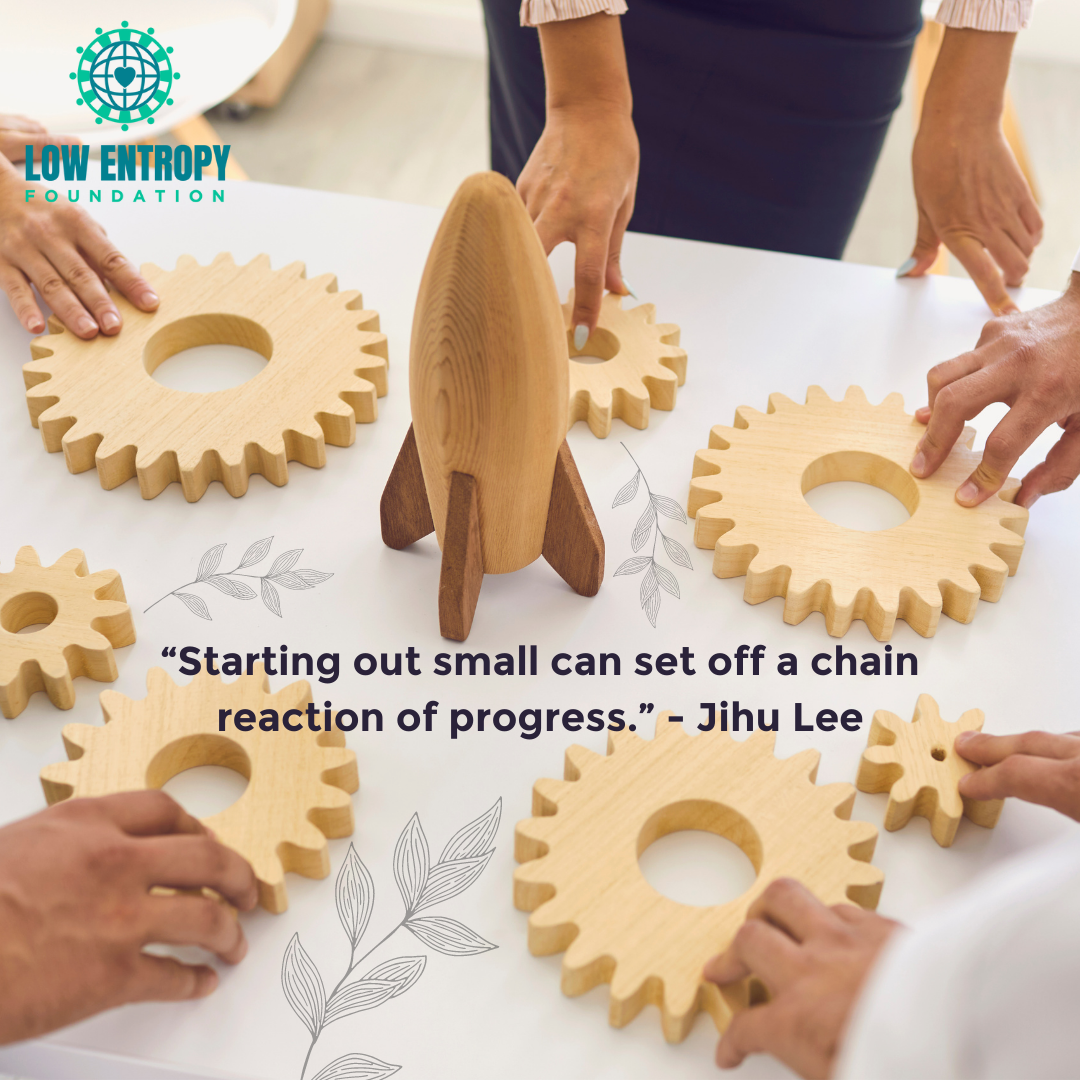Jihu Lee (she/her/hers), Low Entropy Volunteer Writer
Can you think of any skills or abilities you acquired during childhood that are now second nature to you? Perhaps developing a love for a food you used to hate or learning a second language that you are now fluent in. You probably didn’t notice much progress until a sufficient amount of time had passed. Change accrues over time and takes patience, whether we are trying to become skilled at a hobby, see gym results or pull ourselves out of a dark place.
We sometimes can’t help but wish for instant gratification, so we’re often reluctant to start something at all. But starting somewhere, no matter how far of a shot in the dark, will eventually lead us to our goal point. In the 1980s researchers identified six stages of change, the first of which is mere precontemplation, where people have no intention whatsoever of changing their behavior or lifestyle. This should indicate that even the smallest of steps counts as a move towards change, no matter how unproductive they may seem. It may feel daunting to take a step out of our comfort zones, until we start to see our hard work pay off. But keep in mind that taking initiative puts you further along the way than if you had done nothing at all, even if the beginning looks unpromising.
Another key point to staying on track towards change is to be consistent with our efforts. During times when everything seems stagnant, rest assured progress is slowly happening. Imagine a leaky tap dripping water into a bucket. Initially, you might think it will take an eternity before that bucket fills up. But be patient and the water will rise to the brim before you know it.
Most importantly, we need to be self-aware and hopeful during our journey towards our dreams. Doing the same thing over and over won’t produce different results. That isn’t what consistent effort entails. Instead, we must push ourselves to be cognizant of where we can improve and to stay humble so that we don’t let a milestone get to our heads. Similarly, we have the right to give ourselves credit for the work we are putting in. Just because change isn’t immediately visible doesn’t mean your efforts are all for naught. Rebecca Solnit’s take on being hopeful is that it is the balance between optimism – the belief that everything will be fine without taking responsibility – and pessimism – the belief that everything will end up in ruins no matter what. Between these hot and cold endpoints is the gradient of uncertainty where it is up to us to take action. Hope reassures us that no matter what kind of outcome we get, our efforts create the ultimate impact.
Here is what we have discussed so far about working towards change:
- Take a step: it doesn’t matter how small or if you’re doubtful of whether or not it’ll be worth it. All you need is to start, and from then on, you’ve already pointed yourself in the direction of change.
- Just because you don’t see anything yet doesn’t mean nothing is happening: don’t be discouraged when you can’t see much progress overnight, within a week, over the course of months or even years! Change doesn’t adhere to deadlines, so always remind yourself that every effort you put in will reward you somehow, even if not in the way you’d expect.
- Don’t be afraid to evolve: not surprisingly, in order to see change, we must change. This can mean different things for every individual. You might recognize where you lack and intensify your efforts, while another person learns to respect their own boundaries and give themselves the rest they need in order to be more productive. Whatever it takes, we have to evolve if we want to create change in our lives.
- There is hope: it is okay if your investments didn’t produce the rewards you wanted. Even if you didn’t fulfill the goal you were aiming for, the experience you acquired in striving to reach it will surely serve you well in another walk of life.
Starting out small can set off a chain reaction of progress. As a final note, I want the reader to remember that everyone lives at a different pace, and a slow journey is never a sign of inadequacy. And it is never too late to try something new as long as
you just start!
—
My name is Jihu, and I’m from Salt Lake City, Utah! I have been with Low Entropy since May 2021. Some of the things I love are reading, writing, listening to music, playing with my dogs and spending time with my sister!







